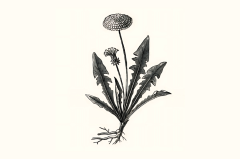Historically, dandelion root and leaves have been used in Chinese and European cultures. Dandelion can be consumed in many ways: the root either as a casserole vegetable or roasted as a coffee alternative (two-year-old roots are best); the leaves and the flowers in salads and teas; and even the sap can be used topically to reduce skin infections. As it grows so well in the Australian climate, dandelion is considered a weed, but nothing could be further from the truth. Grow some in your backyard and use it for its multiple health benefits.
Active ingredients
Dandelion has an abundance of bitter principles in all parts of the plant, as well as sterols structurally related to bile. It also contains an anti-allergy terpene and large amounts of polysaccharides, including inulin (a major prebiotic), pectin and various flavonoids.
Flavonoid glycosides have been isolated from the flowers and leaves. The flowers are also high in luteolin, known for its anti-inflammatory activity. Dandelion has four times the provitamin A found in spinach, and more vitamin C than tomatoes. Chlorophyll, vitamins C and D, B vitamins and choline are present in dandelion. Its mineral content includes high levels of potassium and magnesium, along with silicon, manganese, zinc, copper, iron and phosphorus.
Dandelion root
Liver detoxification & blood cleanser: By stimulating bile production, dandelion root may significantly improve liver function, removing obstructions of the liver, gall bladder and spleen while purifying the blood. It may also improve liver hormone regulation, regulate blood glucose and help the body break down fats. Dandelion may help flush fat deposits from the liver.
Research also shows that dandelion has the potential ability to regenerate damaged liver cells. It’s excellent for improving “hot” inflammatory conditions that are related to the liver, such as acne, eczema, red burning eyes, headaches (with a tense neck) and inflammatory arthritis.
Digestion: Bitter herbs stimulate digestive enzyme production. Historically and today, dandelion improves the function of the pancreas, spleen and stomach, and is helpful in stimulating the appetite. The high prebiotic inulin component of dandelion leaves and roots increases levels of bifidobacteria and lactobacilli in the gut.
Endocrine system: The high inulin content of the plant also indicates a blood-glucose-modulating activity by improving insulin secretion.
Immune system: Dandelion has been shown to restore immune function in immune-suppressed mice, enhancing cell-mediated immunity, humoral immunity and non-specific immunity. In experimental research, extracts of dandelion leaf have shown a decrease in the proliferation and invasiveness of both breast and prostate cancer cells. The root has shown promise in inducing apoptosis in human pancreatic cancer cells, as well as in colon cancer and chronic leukemic cells.





